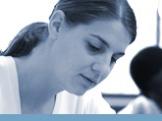Laura Mathematics – University of Southampton
As part of her UAS module, Laura chose the subject Verbal Communication of Mathematics as her special project. Working with high ability year 9 GCSE pupils and year 7 pupils in a rural grammar school she decided, in conjunction with her host teacher, to try to help engage those pupils who did not participate regularly in class.
Using a range of teaching techniques and materials, such as questionnaires, handouts, pair work and small group work, she analysed the circumstances in which pupils felt less or more comfortable, and adapted the teaching environment and her methods accordingly. She also analysed the ways in which pupils preferred to learn, either through visual, auditory or kinaesthetic means.
On the basis of her observations, she presented a series of documents and materials including charts, diagrams and a report to her host teacher in order to share her findings on how to improve participation and verbal communication amongst the mathematics pupils, including comparisons of problems in Yr 7 and Yr 9. Laura is now taking a PGCE course at Canterbury.
Julia Physics – University of Surrey
Julia, on placement at a comprehensive school in Guildford, worked with a top set science class. As part of her work with the school she decided to see if she could help create some lasting resources based on her own subject knowledge. She looked at the range of teaching materials, textbooks and A/V aids available to her in the school and began to explore what practical equipment she could utilize.
She discovered a locked cupboard in the science lab and, using her own initiative, tracked down the key and found inside various pieces of equipment which had not been used for years. With the agreement of her host teacher she dusted-off and repaired the equipment, including Geiger Counters and Electroscopes, and set about creating a range of hands-on practical demonstrations and worksheets on radioactivity, presenting these to her class. She has subsequently taught the school technicians how to use the equipment, given classroom demonstrations with them, and created ICT-based resources aligned with relevant parts of the National Curriculum.
The teachers in the school have said that all the resources will be used in the school for years to come, and that they will set the groundwork for future physics teaching within the school.
Glen Mathematics – University of Southampton
Glen worked in a particularly challenging comprehensive school, choosing to create a series of ten-minute starters as his special project in order to engage pupils in areas they found daunting. He created five starters in total, covering five different mathematical topics.
The style of the starters was interactive and fun in nature, ranging from bingo to team games. He utilized a wide range of materials and teaching techniques, including board work, OHPs, worksheets and small group work. With some guidance from his host teacher he researched each topic from textbooks and on-line resources, analyzing the level of the pupils and evaluating the pupils opinion of the starters after each lesson. He found the pupils to have greatly enjoyed their work.
Glens school had resource and staffing difficulties during his placement there, including the departure of three maths teachers during one term. As a result, and because of his excellent work and enthusiasm in the school, he was offered a contract until the end of the academic year immediately after his finals. He has now gone on to study a PGCE.

